Andrew Yang warns against dehumanization during Palm Beach Countering Antisemitism Summit
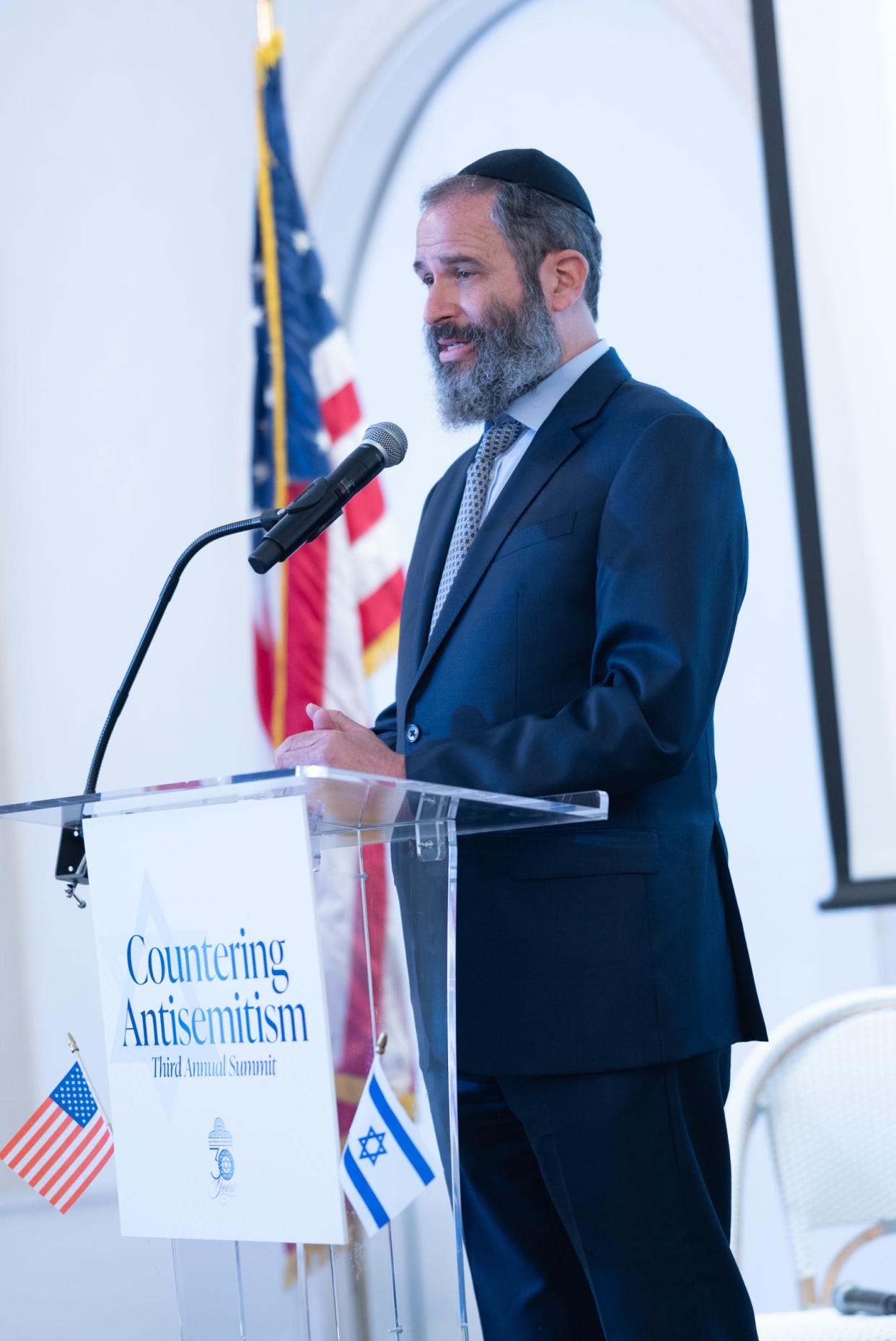
The Jewish community must remain united to combat the increasing rise of antisemitism.
That was the guiding theme highlighted during the Palm Beach Synagogue’s third annual Countering Antisemitism Summit.
“I think before Oct. 7, some may have thought, ‘Well, we beat antisemitism,'” said Palm Beach Synagogue Rabbi Moshe Scheiner, who chaired the summit alongside members of the synagogue Nolan and Michael Greenwald. “But here it is once again as the Torah predicted in every generation.”
The March 20 summit at the Colony Hotel brought together former federal officials, political organizers and civil rights advocates to discuss and explore strategies for combating antisemitic discrimination and hate speech.
Notable speakers included former presidential candidate Andrew Yang, actress/dancer Montana Tucker and a surprise speech from the consul general of Israel in Miami, Maor Elbaz-Starinsky, who highlighted the importance of the summit, while also criticizing what he said was antisemitic criticism of Israel.
“It’s okay to criticize Israel, but I assume that when you criticize Israel, you hold it to the same standards that you hold any other things (conflicts) that you cover, right?” said Elbaz-Starinsky. “I’m sure you’ve asked the same question about other battles. ... Of course the answer is no.”
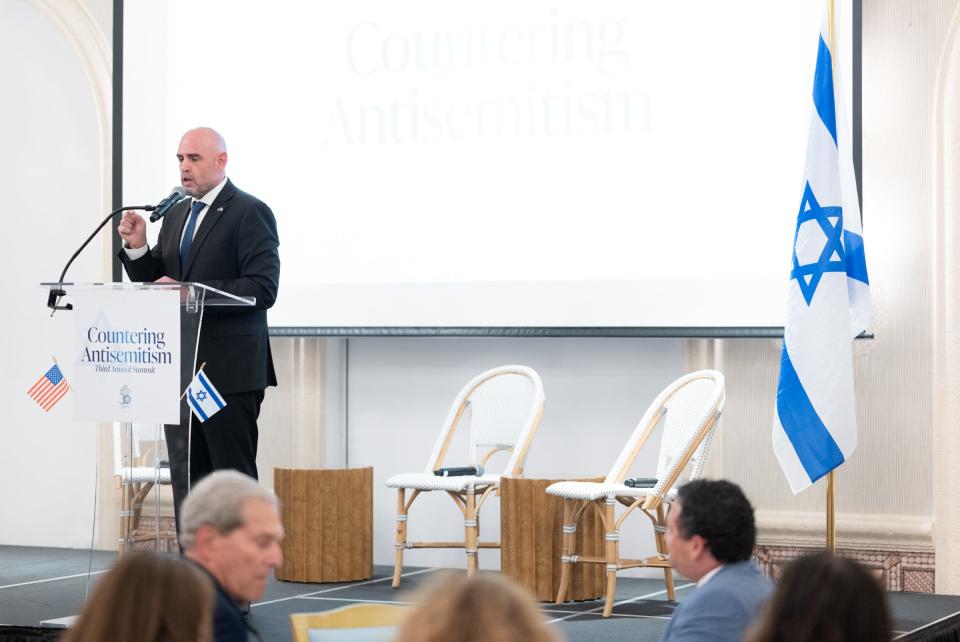
The war, sparked by Hamas’ Oct. 7 attack in Israel that killed about 1,200 people and saw 240 kidnapped — roughly half of whom remain hostage — has left more than 32,000 Palestinians dead, most of those women and children, according to the Health Ministry in Gaza.
While panelists did not discuss the current state of the conflict, much of the conference revolved around its effect in the United States, most notably, the 360% rise in antisemitic incidents recorded by the Anti-Defamation League between Oct. 7 and Jan. 7.
The summit also focused its attention on education as a vital means to illuminating the plight of the Jewish community.
This included a presentation by MorseLife representatives about the organization’s Holocaust Learning Experience Signature Education Model.
A curriculum and professional training resource, the model was created for teachers of grades five to 12 to educate students on the impact of the Holocaust and encourage students to embrace diversity and acceptance of others, said Jenni Frumer, vice president of Strategic Initiative for Morselife.
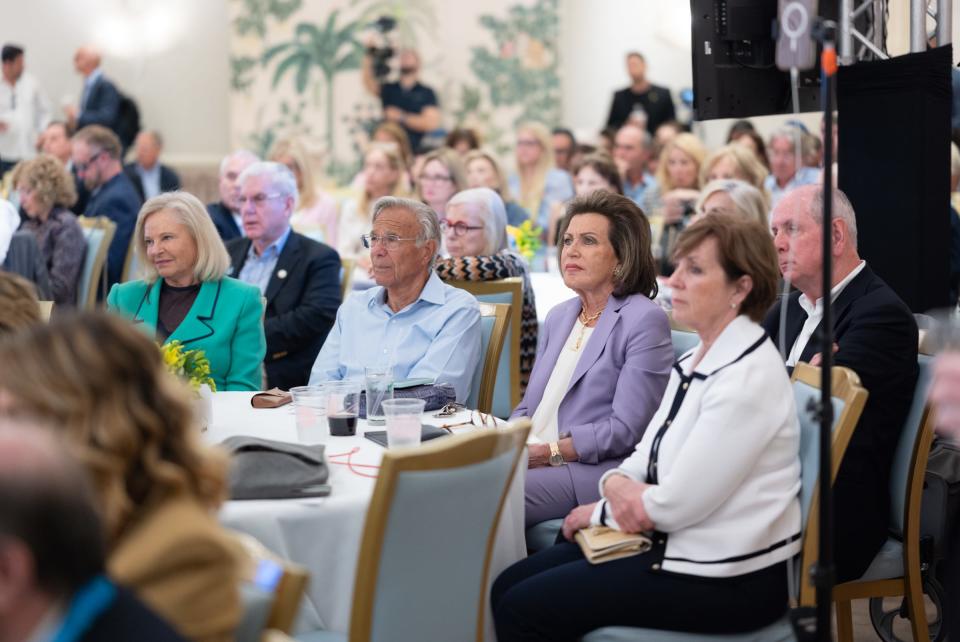
Andrew Yang warns of the danger of dehumanization
Ending the daylong event was a keynote speech by Andrew Yang, a businessman and former Democratic candidate for president, about the dangers of dehumanization.
“The enemy is dehumanization of Jews, dehumanization of anyone,” Yang said, who created the Forward Party in 2021. “If you dehumanize people, then you can do terrible things to them and it feels somehow moral.”
Yang blamed politicians for inciting hate. The current political system incentivizes “toxic, noxious, terrible rhetoric and behavior,” he said.
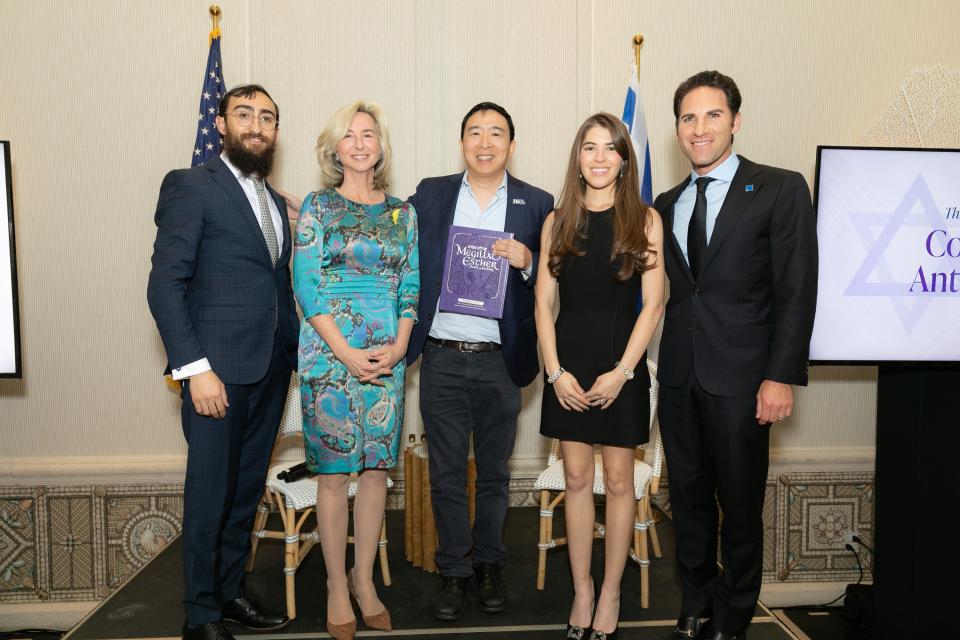
He also blamed the culture of U.S. universities.
The culture of universities ... put’s everything in this binary formular, where you are either the oppressed or the oppressor,” Yang said. “Jews have somehow found themselves in the powerful oppressor role.”
Yang noted that just like American Jews, hate and discrimination toward Asian Americans has often been downplayed because of their stereotypical status as a “model minority."
He said the Asian American community can learn from the Jewish community’s own efforts to combat discrimination and become more politically active.
According to a 2021 report from the Reflective Democracy Campaign, while 6.1% of the U.S. population identifies as Asian American and Pacific Islanders, they were were just 0.9% of all U.S. elected officials as of mid-2020.
"But it's a passion of mine to try and change it," Yang said. "And I think one way we can change it is frankly by learning from you all."
Crisis on Campus Panel sparks debate
One of the liveliest discussions of the day came during a panel that discussed antisemitism on college campuses.
Titled “Crisis on Campus: What Can Be Done?” the panel began with moderator Ben Trachtenberg asking whether panelists agreed with the framing of the title.
Allen Sessoms, managing partner at Higher Education Innovation Group, said the problem has been blown out of proportion.
“I’ve been through crisis on campus; it’s really different than this,” said Sessoms, who served as president for multiple colleges including Queens College and City University of New York. “The trouble is that (there are) a lot of people who are being paid to hype it.”
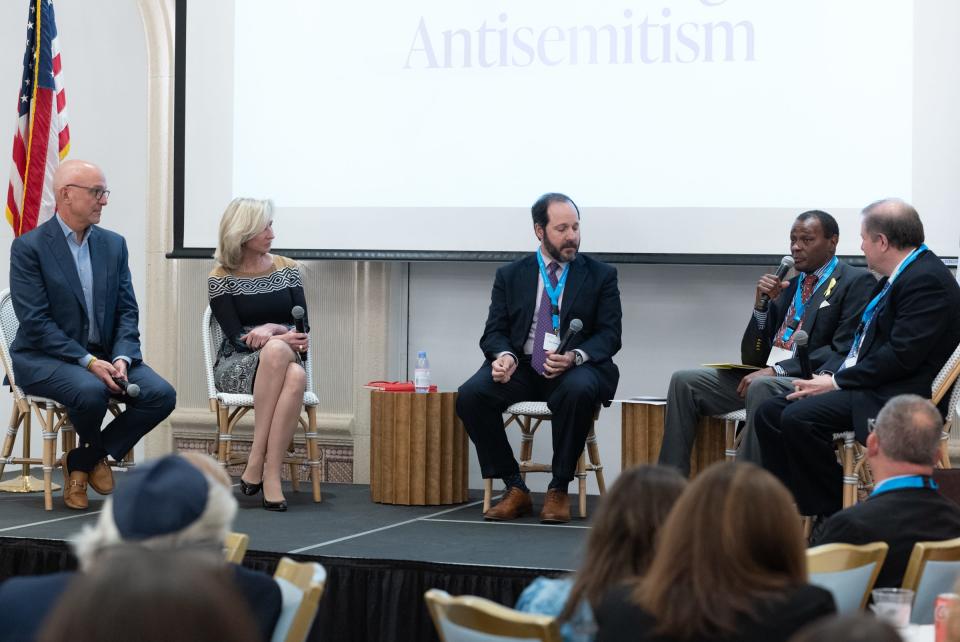
Steven Poskanzer, president emeritus of Carleton College in Northfield, Minnesota, said while he viewed antisemitism of college campuses as a serious concern, he does not like framing the issue as a crisis.
“We’ve seen colleges and universities be in the middle of moments, where they’re sort of the target of lots of anger, and historically we have worked our way through that,” he said.
Ted Deutch, CEO of the American Jewish Committee and a former member of Congress, noted a recent Jewish committee survey that found that 44% of Jewish college students have been affected by antisemitism while on campus.
“When you (colleges) refuse to enforce your own code of conduct ... the result of that is that you’re silencing Jewish students,” said Deutch.
Much of the conversation centered on the role of public university presidents in making public statements.
Sessoms emphasized the delicate and nuanced stance he believes a public university president must take during a politically tense period.
Trachtenberg, associate dean for Academic Affairs at the University of Missouri School of Law, concurred, and noted that the president of his university refuses to make statements about global events.
“So, when the time came for people who wanted statements about Israel, he said, ‘I’m happy to do anything I can do to help the Jewish community, but I’m not in the statement business,’” said Trachtenberg.
Kerry Healey, former Massachusetts lieutenant governor and president emerita of Massachusetts-based Babson College, said that while it was fine for university professors to remain neutral regarding any statements as head of a public institution, the university must still address critical events through educational programming.
“So, then you need to bring the different voices to the campus, make sure that people feel safe ... to participate, to learn, to express their opinion in a civil way ... and to make sure that the campus climate is safe for that kind of learning,” said Healey. “That’s what colleges were made for.”
Deutch said that university presidents need to have moral clarity, citing the pro-Palestine marches — which he said were in support of the Hamas attack — that occurred following the Oct. 7 attack before Israel announced its siege of Gaza on Oct. 9.
“When people are out in the streets marching in support of the most horrific day for the Jewish people since the Holocaust ... it is important to show moral clarity, to set the tone for what that university campus is going to mean for Jewish students as well,” Deutch said.
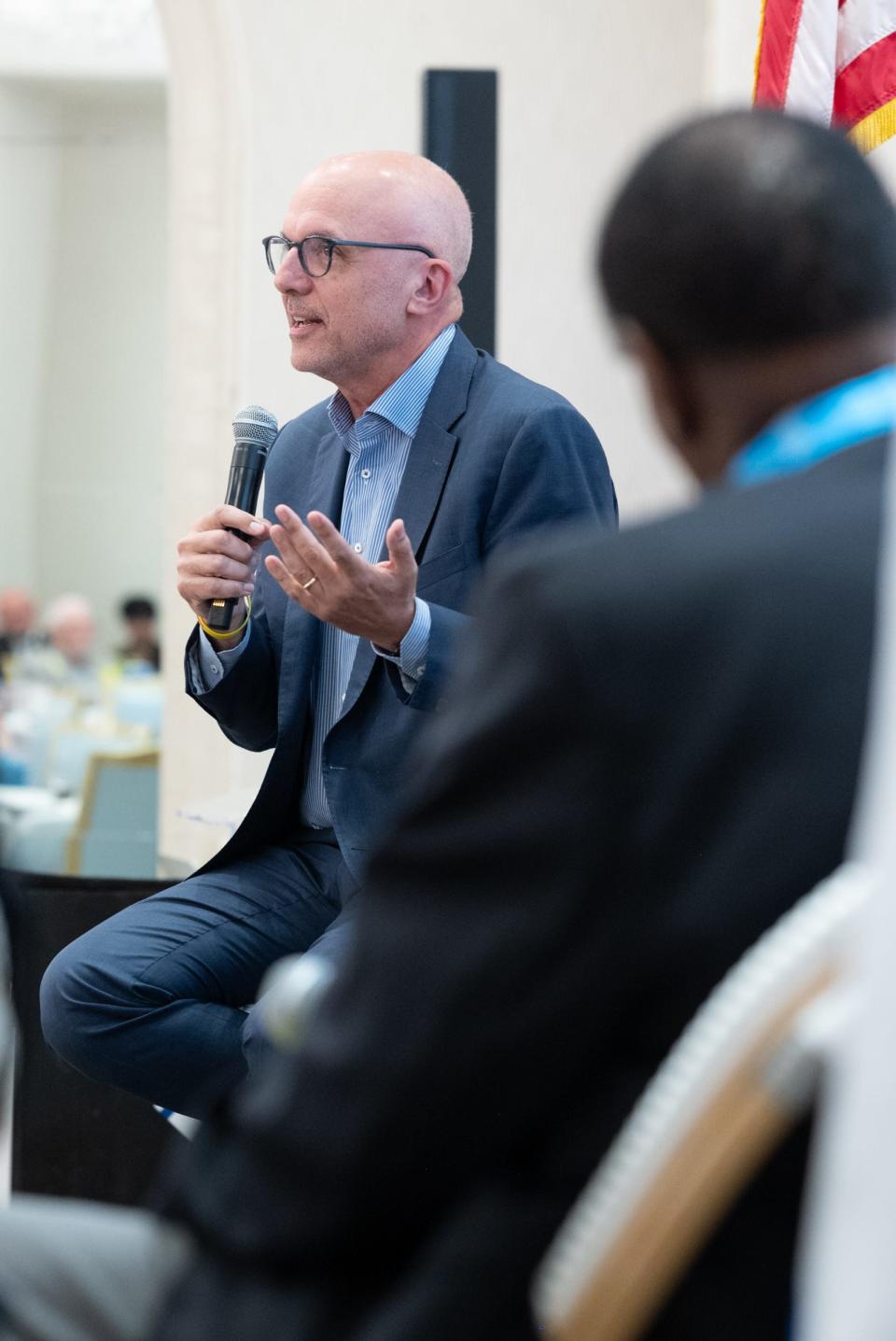
While Sessoms agreed that university presidents need to have moral clarity, he also emphasized the fact that as a public employee, university presidents are limited in what they are allowed to say, either as the head of a university or as a private person.
Regarding changes that can be made on campus, panelists highlighted the impact donors, board of trustees members and alumni can have in shaping university policy.
Deutch also called for an audit of the Jewish Studies, Middle Eastern studies and Israeli Studies departments within U.S universities, saying they are filled with professors holding anti-Israel bias.
Diego Diaz Lasa is a journalist at the Palm Beach Daily News, part of the USA TODAY Florida Network. You can reach him at dlasa@pbdailynews.com. Help support our journalism. Subscribe today.
This article originally appeared on Palm Beach Daily News: Andrew Yang warns of dehumanization during Palm Beach antisemitism summit

